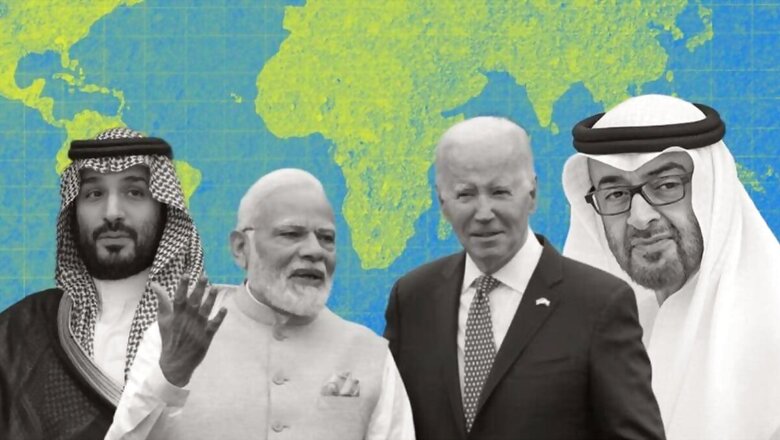
views
India, Saudi Arabia, UAE and the United States are set to announce a major joint infrastructure deal that will connect the Gulf and Arab countries via a network of railways as well as connect with India through shipping lanes from ports in the region.
Saudi Crown Prince Mohammed bin Salman, who is on a state visit to India amid the G20 Summit, was received by India’s Railways Minister Ashwini Vaishnaw on his arrival. There has been speculation around this infrastructure plan since May, when India’s National Security Advisor Ajit Doval travelled to Riyadh for a meeting with US NSA Jake Sullivan and their Saudi and Emirati counterparts.
India is expected to be a key player in the project, not just with its burgeoning market and manufacturing capacity, but also with its labour capital and engineering capacity in the field of railway development.
This may also lead to the involvement of Israel, with the White House pushing a normalisation deal between Saudi Arabia and Israel. With this deal and the soaring ties with UAE since the Abraham Accords signed in 2020, Israel could serve as a stable gateway to the Eastern Mediterranean waters and into Europe. India is also joining hands with the Eastern Mediterranean power bloc of Greece, Cyprus and Israel, further opening up opportunities.
This could very well be the birth of a transcontinental economic corridor spanning from Greece in Europe to Israel through the eastern Mediterranean and from Israel to India across the Arabian Peninsula and the Arabian Sea.
There is a mega-deal with Saudi Arabia on the cards that the Joe Biden administration is keen to achieve before the 2024 US Presidential Elections. This will be a major infrastructure project and is one of the key initiatives that President Biden is pushing in West Asia as China’s influence in the region deepens.
West Asia is a key part of China’s Belt and Road vision. If the deal comes through, it will be the most highlighted success for PM Modi and President Biden at the G20 summit in New Delhi.
A transport infrastructure project of continental scale backed by democratic powers India and US, and with the possible involvement of Israel, passing through the Gulf and the Levant is a two-birds-one-stone deal. It helps the US re-establish its presence in West Asia and counter the progress made by China. A freight and shipping corridor spanning several nations shall provide tremendous economic opportunities, including for India, and also help cement lasting peace in the region.
This will be complemented further by the Adani Group-owned Haifa port in Israel, India’s free trade deal with the UAE and soaring ties with the US, Saudi Arabia and Greece.
Biden Rebuilding Relations With Riyadh
An announcement of the project will likely increase the chances of a possible brief bilateral meeting between Biden and Saudi Crown Prince Mohammed bin Salman on the sidelines of the G20.
The US is keen on rebuilding ties with Saudi Arabia, which deteriorated since Joe Biden walked into the White House in 2021. In this time period, Saudi Arabia drifted closer to China and Russia, despite being a Middle Eastern ally of the US.
Saudi Arabia is exploring the development of a nuclear energy program. While the United States remained hesitant to offer its support, China, Russia, and France have expressed their interest in collaborating on this initiative.
Now, however, that may change as the US opens up to the idea and Israel agrees to accept a civilian nuclear programme in Saudi Arabia. The White House is also seeking a renewed defence treaty with Saudi Arabia.
Flashbacks of I2U2
The I2U2, which has been pegged as the West Asian Quad with a focus on countering Chinese influence, comprises India, Israel, the US and the UAE.
The forum, initiated in late 2021, was created with the primary purpose of deliberating on strategic infrastructure ventures in the Middle East. It was conceived as a means to counterbalance Beijing’s increasing influence in the region.
During the past year’s I2U2 meetings, Israel introduced the concept of establishing regional railway connections. This proposal also involved tapping into India’s extensive experience in managing large-scale infrastructure projects, according to one source. Subsequently, the Biden administration broadened the scope of the initiative to encompass the active involvement of Saudi Arabia.
Setback to China’s BRI
Xi Jinping’s highly ambitious Belt and Road Initiative, worth over a trillion dollars, has been losing steam amid global pushback against China’s debt trap diplomacy and other faults which include poorly planned projects, lack of transparency, economic infeasibility and lack of local job creation which made countries question the benefits offered by Beijing.
China’s ulterior motives became clear when it sought to expand its influence through government corruption, political interference, debt trap diplomacy and by pushing Chinese workers and Mandarin on nations that agreed to the BRI project. Such an infrastructure project with “Chinese characteristics” challenged Western powers to follow a more constructive and democratic approach to counter Beijing’s tactics.
India rejected the BRI in 2017 as China and Pakistan agreed on CPEC, an economic corridor which ran through Pakistan-Occupied Kashmir. India continues to oppose this Chinese initiative, and has refused to endorse it at the BRICS and the SCO forums.
Meanwhile, the United States, India, Japan and Australia came together to reform the Quad, focused on the Indo-Pacific as a counterweight to Chinese influence and aggression in the region. The I2U2 hinted in a similar direction when it was formed in 2021.

















Comments
0 comment